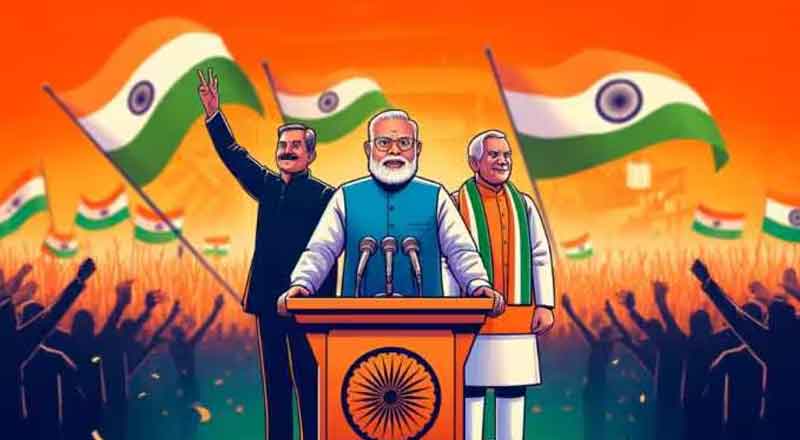In his victory speech on Tuesday, Prime Minister Narendra Modi mentioned Janata Dal (United) chief Nitish Kumar and Telugu Desam Party (TDP) president Chandrababu Naidu. He congratulated both leaders who emerged as potential Kingmakers in the National Democratic Allaince (NDA).
Earlier today, a day after the election results, the top leaders of the NDA have met PM Modi at his residence to discuss the formation of government. During the meeting, PM Modi got a written support from JDU and TDP. The conclusion of today’s meeting was– PM Modi has been unanimously elected the leader of alliance who will be sworn in as the Prime Minister on Saturday.
Following the NDA’s meeting, it has been cleared that Narendra Modi will continue to enjoy the top post with the support of his allies. PM Modi will be the second leader to retain the power for the third consecutive time after former PM Jawahar Lal Nehru.
The experts believe that the third term will be very challenging for PM Modi as his top post is heavily dependent on his coalition partners like Nitish Kumar and Chandrababu Naidu.
This will be the first time when Modi will run the government with the support of his allies. This time Modi, who has been know to work as a leader of one man army with absolutely centralised power, will have to compromise as his party failed to get a clear majority in the 543-member of Lok Sabha.
Many political scientists believe that third term will be challenging tenure for Narendra Modi.
Under the coalition government, the allies will not only seek key portfolios but also give a tight hand to PM Modi, who has been know for his uncompromised working style, to run the government.
It will not only be challenging for PM Modi to take everyone together but also his bargaining skills will be a time-tested—something that has never done before in his political career.
Both JD(U) and TDP, according to sources, may seek key positions in the Modi-led cabinet, including the Speaker’s post in the parliament.
Bihar Chief Minister Nitish Kumar, who joined the NDA months before the 2024 Lok Sabha elections, will try to fulfill his a long-standing demand to provide special state status to Bihar under a coalition government.
At the same time, Nitish Kumar may also push the Central government to conduct a caste-based census in the country—a demand that has never been openly supported by the BJP.
Chandrababu Naidu will also have opportunity to provide special status to Andhra Pradesh under the Modi-led coalition government.
This is not the first time for the BJP to run the government with the help of its allies.
In 1999, the Atal Bihari Vajpayee led NDA government failed to govern the coalition government after Jaylalitha’s AIADMK withdrew its support.
By contrast, from 1998 to 2004, the BJP successfully ran a coalition government under again Prime Minister Atal Bihari Vajpayee.
(With inputs from agencies)





